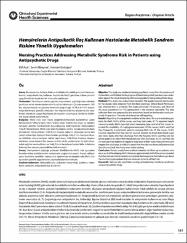Nursing Practices Addressing Metabolic Syndrome Risk in Patients using Antipsychotic Drugs
Künye
Aşık E., Albayrak S., Erdoğan N. (2016). Hemşirelerin Antipsikotik İlaç Kullanan Hastalarda Metabolik Sendrom Riskine Yönelik Uygulamaları. Clinical and Experimental Health Sciences, 6(4), 161 - 165.Özet
Objective: This study was conducted among psychiatric nurses from the provinces of Ankara, Bolu, and Kirikkale for the purpose of determining which practices were undertaken against the risk of developing MetS among patients taking antipsychotic drugs. Methods: This study was a descriptive research. The legally required permissions for the studies were obtained from the three provinces. Ethical Board Permission was obtained from a university. The study comprised 145 persons, and 78.6% of the study population (n=114) participated in the research voluntarily. The data collection form was prepared by the researchers based on the literature and comprised 24 questions. The data were based on self-reporting. Results: Regarding the equipment available at the clinics for use in evaluating patients for MetS, 98.2% of the nurses said they had scales, 87.7% reported height measuring tools, 86.0% reported waist measuring tape, and all of the nurses reported the availability of a sphygmomanometer. Of the nurses, 36.8% said that they frequently encountered patients carrying MetS risk. Of the nurses, 55.8% however reported that they did not counsel patients to check their blood sugar and blood lipids after their discharge from the hospital, 42.5% said they did not advise patients to check their blood pressure after discharge, 42.5% said they did not educate their patients to regularly keep track of their waist measurements and weight after discharge, and 60.2% stated that they did not always tell patients that they should check their body mass index reading. Conclusion: Nurses usually have available materials to follow up on patients who are at a risk of developing MetS. However, approximately half of the nurses revealed that they did not inform patients during their discharge or at their follow-ups about the monitoring procedures that are necessary in terms of MetS risk.
















